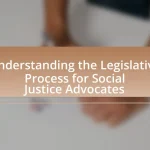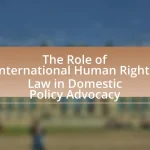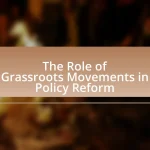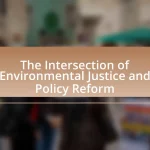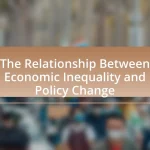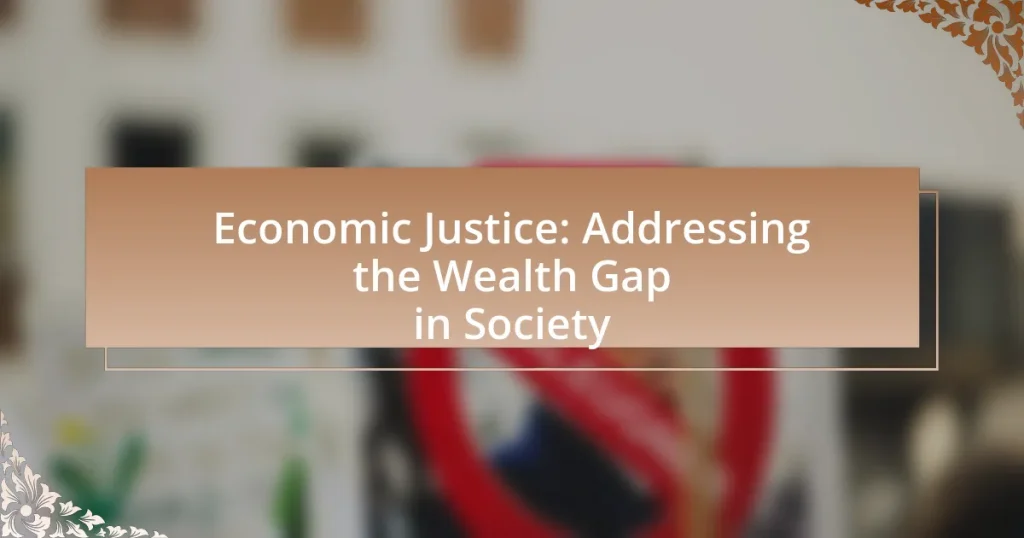Economic justice is defined as the fair distribution of wealth, opportunities, and privileges within a society, aiming to ensure that all individuals have access to resources necessary for a decent standard of living. This article explores the significance of economic justice in addressing systemic inequalities that contribute to poverty and social unrest, highlighting its relationship with social equity and the wealth gap. Key principles of economic justice, such as equity, access, participation, and rights, are discussed alongside the factors contributing to the wealth gap, including income inequality and education disparities. The article also examines the role of progressive taxation, education, and social programs in promoting economic justice, as well as the challenges and political barriers that hinder progress in achieving a more equitable society.
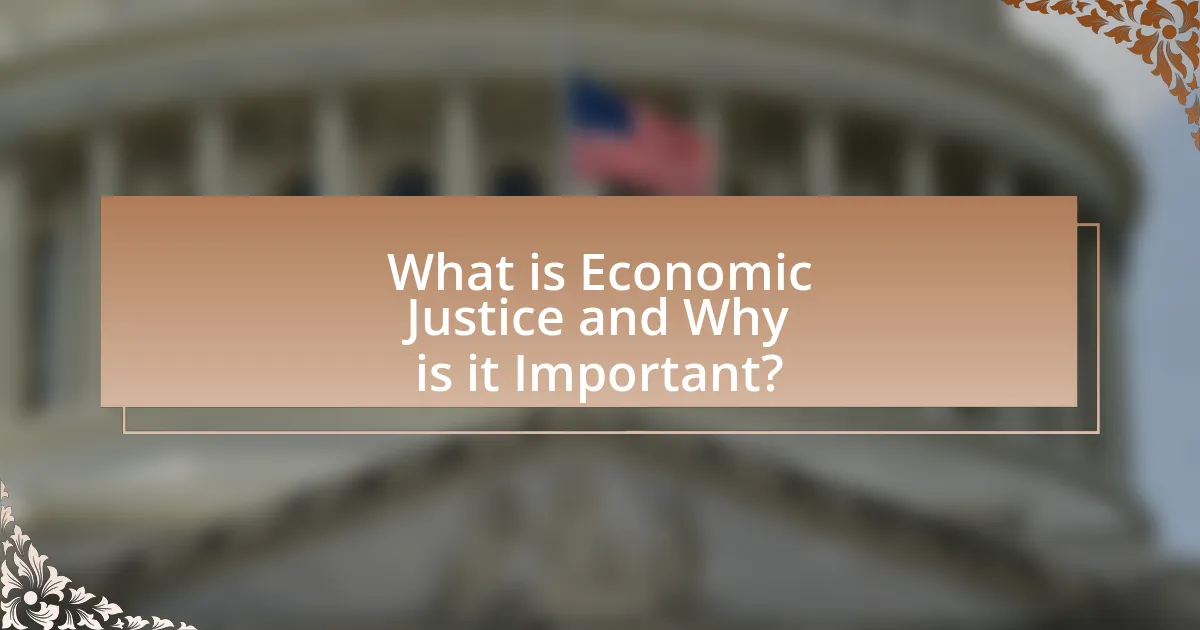
What is Economic Justice and Why is it Important?
Economic justice refers to the fair distribution of wealth, opportunities, and privileges within a society, ensuring that all individuals have access to the resources necessary for a decent standard of living. It is important because it addresses systemic inequalities that contribute to poverty and social unrest, promoting social stability and cohesion. Research indicates that societies with greater economic justice experience lower crime rates and improved public health outcomes, as equitable access to resources fosters a sense of community and belonging. For instance, the World Bank has documented that reducing income inequality can lead to sustainable economic growth, highlighting the critical role of economic justice in enhancing overall societal well-being.
How is Economic Justice Defined in Society?
Economic justice is defined in society as the equitable distribution of resources and opportunities, ensuring that all individuals have access to the means necessary for a decent standard of living. This concept emphasizes fairness in economic policies, aiming to reduce disparities in wealth and income among different social groups. For instance, the United Nations’ Sustainable Development Goals highlight the importance of reducing inequality within and among countries, underscoring the global commitment to achieving economic justice.
What are the key principles of Economic Justice?
The key principles of Economic Justice include equity, access, participation, and rights. Equity ensures fair distribution of resources and opportunities, addressing disparities in wealth and income. Access emphasizes the importance of providing individuals with the means to participate in economic activities, such as education and employment. Participation involves engaging all members of society in economic decision-making processes, ensuring that diverse voices are heard. Rights focus on recognizing and protecting the economic rights of individuals, including the right to work, fair wages, and social security. These principles collectively aim to create a more just and equitable economic system, reducing the wealth gap in society.
How does Economic Justice relate to social equity?
Economic justice is fundamentally linked to social equity as it seeks to ensure fair distribution of resources and opportunities, which directly impacts marginalized communities. Economic justice advocates for policies that address income inequality, access to education, and employment opportunities, thereby promoting social equity by leveling the playing field for all individuals. For instance, research from the Institute for Policy Studies indicates that wealth inequality in the U.S. has reached levels not seen since the Great Depression, highlighting the urgent need for economic justice initiatives to foster social equity. By addressing systemic barriers and redistributing wealth, economic justice contributes to a more equitable society where all individuals have the chance to thrive.
What is the Wealth Gap and How is it Measured?
The wealth gap refers to the unequal distribution of assets among individuals or groups within a society. It is measured using various metrics, including the Gini coefficient, which quantifies income or wealth distribution on a scale from 0 (perfect equality) to 1 (perfect inequality), and wealth percentiles that compare the net worth of different segments of the population. For instance, data from the Federal Reserve’s Survey of Consumer Finances indicates that in 2019, the top 10% of households held 70% of total wealth in the United States, illustrating significant disparity.
What factors contribute to the wealth gap in society?
The wealth gap in society is primarily influenced by income inequality, education disparities, and systemic discrimination. Income inequality arises when a small percentage of the population controls a significant portion of wealth, often due to high-paying jobs in certain sectors, while others remain in low-wage positions. Education disparities contribute to the wealth gap as individuals with higher education levels typically secure better-paying jobs, leading to increased wealth accumulation. Systemic discrimination, including racial and gender biases, further exacerbates the wealth gap by limiting access to opportunities and resources for marginalized groups. According to the U.S. Census Bureau, the top 20% of earners hold over 50% of the nation’s wealth, highlighting the stark contrast in wealth distribution.
How do income disparities affect Economic Justice?
Income disparities significantly undermine economic justice by perpetuating inequality in access to resources and opportunities. When wealth is concentrated in the hands of a few, it limits the ability of lower-income individuals to participate fully in the economy, leading to systemic disadvantages in education, healthcare, and employment. For instance, according to the U.S. Census Bureau, the Gini coefficient, which measures income inequality, has increased from 0.394 in 1967 to 0.481 in 2020, indicating a growing wealth gap that correlates with reduced social mobility and increased poverty rates. This disparity not only affects individual livelihoods but also hinders overall economic growth, as a less equitable distribution of income can lead to decreased consumer spending and lower economic productivity.
Why Should We Address the Wealth Gap?
Addressing the wealth gap is essential for promoting social stability and economic growth. A significant wealth gap can lead to increased social unrest, as evidenced by studies showing that societies with high inequality experience more crime and political instability. Furthermore, reducing the wealth gap can enhance economic productivity; research from the International Monetary Fund indicates that lowering income inequality can boost economic growth by up to 0.5% annually. Therefore, addressing the wealth gap is crucial for fostering a more equitable and prosperous society.
What are the social implications of the wealth gap?
The wealth gap leads to significant social implications, including increased inequality, social unrest, and diminished social mobility. Research indicates that societies with larger wealth disparities often experience higher rates of crime and lower levels of trust among citizens, as evidenced by studies from the OECD, which show that income inequality correlates with social problems. Furthermore, the wealth gap restricts access to quality education and healthcare for lower-income individuals, perpetuating cycles of poverty and limiting opportunities for upward mobility. This lack of access can result in a less educated workforce, ultimately hindering economic growth and innovation within society.
How does the wealth gap impact economic stability?
The wealth gap negatively impacts economic stability by creating disparities in income and access to resources, which can lead to reduced consumer spending and increased social unrest. When wealth is concentrated in the hands of a few, overall economic growth is stunted because lower-income individuals have less disposable income to spend, which is crucial for driving demand in the economy. According to a report by the International Monetary Fund, countries with higher income inequality tend to experience slower economic growth, as the purchasing power of the majority is diminished. This imbalance can also result in increased debt levels among lower-income households, further destabilizing the economy.
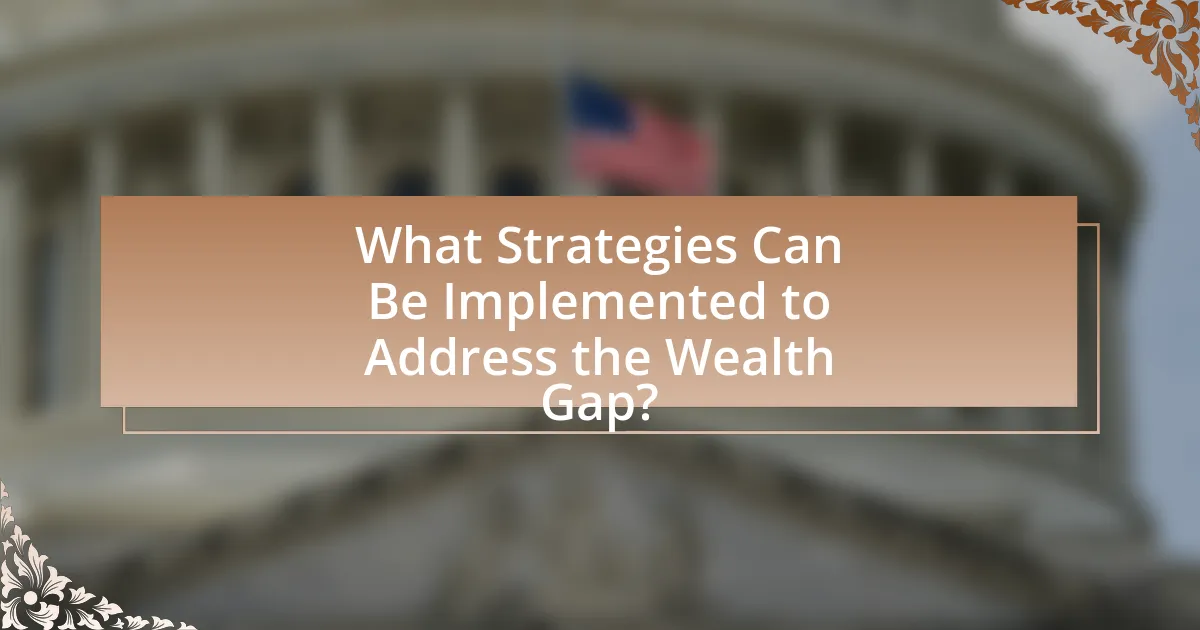
What Strategies Can Be Implemented to Address the Wealth Gap?
To address the wealth gap, implementing progressive taxation is essential, as it redistributes wealth from higher-income individuals to fund social programs. Research indicates that countries with progressive tax systems, such as Sweden and Denmark, have lower wealth inequality, with the Gini coefficient reflecting this disparity. Additionally, increasing access to quality education and vocational training can empower lower-income individuals, leading to better job opportunities and higher earnings. Studies show that educational attainment significantly correlates with income levels, highlighting the importance of investing in education to bridge the wealth gap. Furthermore, promoting affordable housing initiatives can help reduce wealth disparities by ensuring that low-income families have access to stable living conditions, which is crucial for economic mobility. Data from the National Low Income Housing Coalition indicates that affordable housing can lead to increased savings and investment opportunities for low-income households.
How do Progressive Taxation Systems Work?
Progressive taxation systems impose higher tax rates on individuals with higher income levels, effectively redistributing wealth to reduce economic inequality. In these systems, income is divided into brackets, with each bracket taxed at an increasing rate; for example, lower income may be taxed at 10%, while higher income could be taxed at 30% or more. This structure aims to ensure that those who can afford to contribute more to public services and social programs do so, thereby funding initiatives that benefit society as a whole. Historical data shows that countries with progressive tax systems, such as Sweden and Denmark, have lower income inequality compared to those with flat tax rates, highlighting the effectiveness of this approach in addressing wealth disparities.
What are the benefits of progressive taxation for Economic Justice?
Progressive taxation benefits economic justice by reducing income inequality and ensuring that wealthier individuals contribute a fairer share to public resources. This system allows governments to fund essential services such as education, healthcare, and infrastructure, which disproportionately benefit lower-income populations. For instance, according to the Institute on Taxation and Economic Policy, states with progressive tax systems tend to have lower poverty rates and better access to public services. By redistributing wealth through higher tax rates on the affluent, progressive taxation promotes social equity and enhances overall economic stability.
How can tax reforms reduce the wealth gap?
Tax reforms can reduce the wealth gap by implementing progressive taxation, which increases tax rates on higher income brackets while lowering rates for lower-income individuals. This approach redistributes wealth more equitably, allowing for increased funding for social programs that benefit lower-income populations. For instance, the Congressional Budget Office reported that progressive tax policies can significantly reduce income inequality by ensuring that wealthier individuals contribute a fairer share of their income, thereby providing resources for education, healthcare, and social services that disproportionately aid lower-income families.
What Role Does Education Play in Economic Justice?
Education plays a crucial role in economic justice by providing individuals with the skills and knowledge necessary to access better job opportunities and higher wages. Access to quality education reduces income inequality, as studies show that individuals with higher education levels tend to earn significantly more over their lifetimes compared to those with less education. For instance, the U.S. Bureau of Labor Statistics reports that in 2021, individuals with a bachelor’s degree earned approximately 67% more than those with only a high school diploma. This disparity highlights how education serves as a pathway to economic mobility, enabling marginalized groups to break the cycle of poverty and contribute to a more equitable society.
How can access to education reduce income inequality?
Access to education can reduce income inequality by equipping individuals with the skills and knowledge necessary for higher-paying jobs. When more people have access to quality education, they can improve their employability and earning potential, leading to a more equitable distribution of income. For instance, research from the Organisation for Economic Co-operation and Development (OECD) shows that individuals with higher education levels earn significantly more over their lifetimes compared to those with only a high school diploma. This wage gap illustrates how education serves as a critical pathway for upward mobility, thereby narrowing the income disparity between different socioeconomic groups.
What educational policies promote Economic Justice?
Educational policies that promote economic justice include equitable funding for schools, access to quality early childhood education, and inclusive curriculum development. Equitable funding ensures that schools in low-income areas receive adequate resources, which is essential for providing a quality education. Access to quality early childhood education has been shown to improve long-term economic outcomes for disadvantaged children, as evidenced by studies indicating that early interventions can lead to higher graduation rates and increased earning potential. Inclusive curriculum development fosters a sense of belonging and relevance for all students, which can enhance engagement and academic success, ultimately contributing to reduced wealth disparities.
How Can Social Programs Help Bridge the Wealth Gap?
Social programs can bridge the wealth gap by providing financial assistance, education, and healthcare access to low-income individuals and families. These programs, such as food assistance, housing subsidies, and job training initiatives, directly alleviate poverty and enhance economic mobility. For instance, the Supplemental Nutrition Assistance Program (SNAP) has been shown to lift millions of Americans above the poverty line, reducing food insecurity and allowing families to allocate resources toward education and employment opportunities. Additionally, programs like Head Start improve early childhood education for disadvantaged children, leading to better long-term economic outcomes. Research indicates that investments in social programs yield significant returns, with every dollar spent on early childhood education generating approximately $7 in economic benefits over time.
What types of social programs are most effective?
Effective social programs include universal basic income (UBI), targeted cash assistance, and comprehensive healthcare initiatives. Universal basic income has been shown to reduce poverty and improve economic stability, as evidenced by pilot programs in Finland and Stockton, California, where recipients reported increased well-being and financial security. Targeted cash assistance programs, such as the Earned Income Tax Credit (EITC) in the United States, have been proven to lift millions of families above the poverty line, with studies indicating a significant reduction in child poverty rates. Comprehensive healthcare initiatives, like Medicaid expansion under the Affordable Care Act, have improved access to medical services and reduced financial strain on low-income families, leading to better health outcomes and economic productivity.
How do social safety nets contribute to Economic Justice?
Social safety nets contribute to economic justice by providing financial support and resources to vulnerable populations, thereby reducing inequality. These programs, such as unemployment benefits, food assistance, and healthcare access, help to stabilize the income of low-income individuals and families, enabling them to meet basic needs. For instance, the U.S. Census Bureau reported that social safety net programs lifted approximately 26 million people out of poverty in 2020, demonstrating their effectiveness in promoting economic equity. By ensuring a minimum standard of living, social safety nets play a crucial role in addressing the wealth gap and fostering a more just economic system.
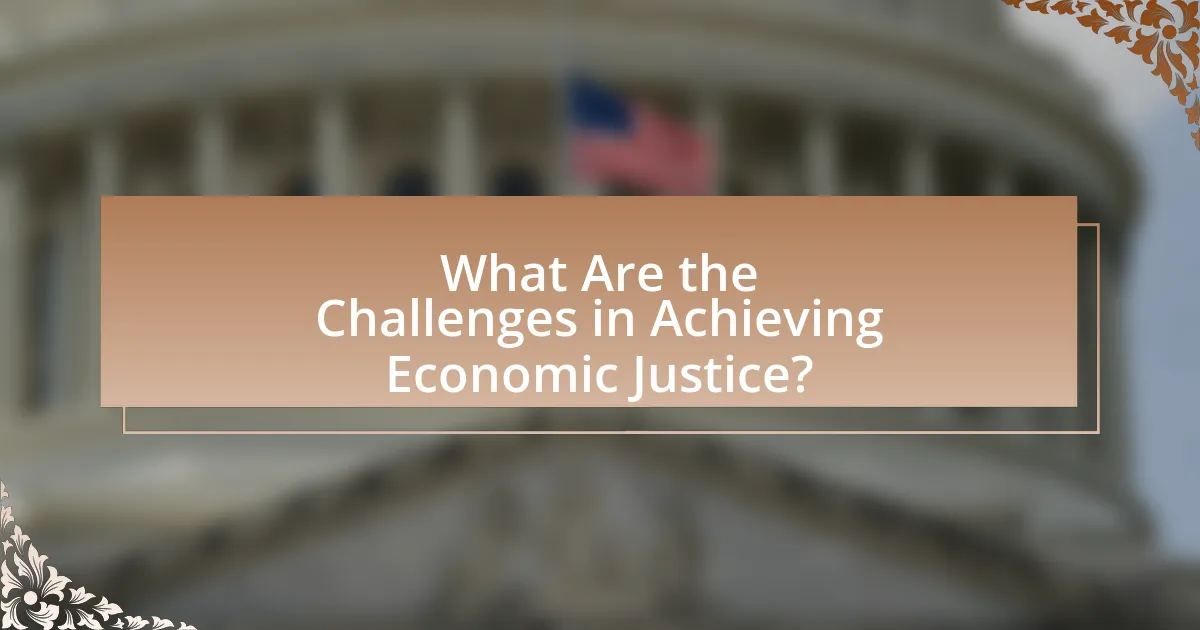
What Are the Challenges in Achieving Economic Justice?
Achieving economic justice faces several challenges, including systemic inequality, lack of access to education, and discriminatory practices in employment and lending. Systemic inequality perpetuates wealth gaps, as marginalized communities often lack the resources and opportunities available to more affluent groups. For instance, according to the U.S. Census Bureau, the median wealth of white households is significantly higher than that of Black and Hispanic households, illustrating the impact of historical injustices. Additionally, limited access to quality education restricts upward mobility, as individuals from lower-income backgrounds may not receive the skills necessary to compete in the job market. Discriminatory practices, such as redlining and biased hiring processes, further entrench economic disparities, making it difficult for affected individuals to achieve financial stability. These interconnected challenges hinder the pursuit of economic justice and require comprehensive policy interventions to address them effectively.
What Political Barriers Exist to Addressing the Wealth Gap?
Political barriers to addressing the wealth gap include legislative gridlock, lobbying by wealthy interests, and partisan polarization. Legislative gridlock often prevents the passage of policies aimed at wealth redistribution, such as progressive taxation or social welfare programs. Lobbying by wealthy individuals and corporations can influence lawmakers to prioritize tax cuts and deregulation over measures that would reduce inequality. Partisan polarization further complicates consensus-building on economic reforms, as differing ideologies lead to resistance against proposed solutions. For instance, the Tax Cuts and Jobs Act of 2017, which disproportionately benefited the wealthy, illustrates how political decisions can exacerbate the wealth gap rather than address it.
How do lobbying and special interests affect Economic Justice initiatives?
Lobbying and special interests significantly undermine Economic Justice initiatives by prioritizing the financial interests of a few over the equitable distribution of resources. For instance, lobbying efforts often lead to the creation of policies that favor corporations and wealthy individuals, which can exacerbate income inequality. According to a report by the Center for Responsive Politics, in 2020, over $3.5 billion was spent on lobbying in the United States, with industries like pharmaceuticals and finance heavily influencing legislation that affects economic equity. This financial influence can result in the dilution or outright rejection of policies aimed at promoting fair wages, affordable housing, and social safety nets, ultimately hindering progress toward economic justice.
What role does public opinion play in shaping policies?
Public opinion significantly influences policy formation by reflecting the collective preferences and values of the population. Policymakers often consider public sentiment to ensure that their decisions align with the electorate’s desires, as seen in democratic systems where public approval is crucial for political survival. For instance, during the 2016 U.S. presidential election, candidates adjusted their platforms based on polling data that indicated strong public support for addressing income inequality, demonstrating how public opinion can drive policy agendas.
How Do Global Economic Trends Impact Local Wealth Gaps?
Global economic trends significantly widen local wealth gaps by influencing job markets, investment flows, and income distribution. For instance, globalization often leads to the concentration of wealth in urban areas where industries thrive, leaving rural regions economically disadvantaged. According to a report by the International Monetary Fund, countries that embraced globalization saw a 10% increase in income inequality, as wealth became concentrated among skilled workers and capital owners. Additionally, technological advancements driven by global markets can displace low-skilled jobs, exacerbating local unemployment and income disparities. Thus, the interplay between global economic dynamics and local economic conditions directly affects the distribution of wealth within communities.
What is the effect of globalization on income inequality?
Globalization generally increases income inequality within countries while reducing it between countries. This occurs because globalization often benefits skilled workers and capital owners more than unskilled laborers, leading to a widening income gap domestically. For instance, a study by the International Monetary Fund in 2017 found that globalization contributed to a rise in income inequality in advanced economies, as the wealth generated from global trade and investment tends to concentrate among the higher-income groups. Conversely, developing countries may experience reduced inequality as they integrate into the global economy, benefiting from foreign investment and access to larger markets.
How do economic crises exacerbate the wealth gap?
Economic crises exacerbate the wealth gap by disproportionately affecting low-income individuals and marginalized communities, leading to increased unemployment and reduced access to resources. During economic downturns, wealthier individuals often have the financial stability to weather the storm, while those with fewer resources face job losses and diminished savings. For instance, the 2008 financial crisis resulted in a significant increase in poverty rates, with the poorest households experiencing a 20% decline in income, while the wealthiest recovered more quickly, further widening the income disparity. Additionally, policies implemented during crises, such as austerity measures, often prioritize the interests of the wealthy, leaving vulnerable populations without adequate support, thus perpetuating and deepening the wealth gap.
What Practical Steps Can Individuals Take to Promote Economic Justice?
Individuals can promote economic justice by advocating for policies that reduce income inequality, such as supporting progressive taxation and minimum wage increases. Engaging in community organizing and participating in local governance can amplify voices for equitable economic policies. For instance, research from the Economic Policy Institute indicates that raising the federal minimum wage to $15 by 2025 could lift 1.3 million workers out of poverty. Additionally, individuals can support businesses that prioritize fair labor practices and invest in local economies, which fosters sustainable growth and equitable wealth distribution.
How can community engagement foster Economic Justice?
Community engagement can foster economic justice by empowering marginalized groups to advocate for equitable policies and resources. When communities actively participate in decision-making processes, they can identify and address systemic inequalities that contribute to the wealth gap. For instance, research from the Urban Institute highlights that community-led initiatives, such as cooperative businesses and local investment strategies, can enhance economic opportunities for underrepresented populations. These initiatives not only create jobs but also ensure that the economic benefits are retained within the community, thereby promoting sustainable economic growth and reducing disparities.
What actions can individuals take to support equitable policies?
Individuals can support equitable policies by advocating for inclusive legislation and engaging in community organizing. Advocacy can involve contacting elected officials to express support for policies that promote economic justice, such as raising the minimum wage or implementing progressive taxation. Community organizing allows individuals to mobilize others around shared goals, fostering collective action that can influence policy changes. Research shows that grassroots movements have historically led to significant policy reforms, such as the Civil Rights Movement, which resulted in landmark legislation like the Civil Rights Act of 1964. By participating in these actions, individuals contribute to a broader push for equitable policies that address the wealth gap in society.
